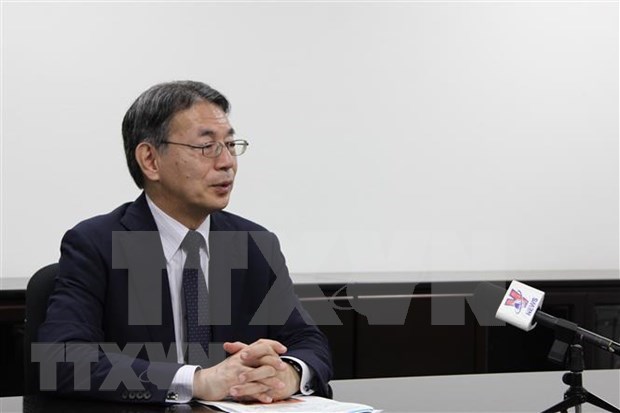Japanese professor lauds Vietnam’s development of national database on assets, incomes
 Professor Hirofumi Takada, Vice Chairman of the Japanese National Graduate Institute for Policy Studies, speaks to the Vietnam News Agency's correspondent. (Photo: VNA)
Professor Hirofumi Takada, Vice Chairman of the Japanese National Graduate Institute for Policy Studies, speaks to the Vietnam News Agency's correspondent. (Photo: VNA)Tokyo (VNA) – Vietnam’s development of a national database on assets and incomes is a great stride towards the formation of an effective mechanism against corruption, Professor Hirofumi Takada, Vice Chairman of the Japanese National Graduate Institute for Policy Studies, has said.
In an interview granted to the Vietnam News Agency (VNA)'s resident correspondent in Tokyo, the professor said it is more important to make officials understand the objective and necessity of the database.
If public servants are not aware of the significance of the system, they are more likely commit non-transparent acts relating to illegal assets, he explained.
He also shared Japan’s experience in this regard, with the adoption of the National Public Service Ethics Law in 1999, which came into force in 2000, and the issuance of the National Public Service Ethics Code, stipulating acts that public servants should not engage in.
Deputy Prime Minister Le Minh Khai on March 28 signed Decision No. 390/QD-TTg approving a project to build the national database on assets and incomes, aiming to promote digitalisation and modernisation in management.
The project aims to provide accurate, full and updated information on assets and incomes and other relevant data to serve the prevention, detection and handling of corruption.
In the 2022-2023 period, the project will build and put into trial operation technical systems and software to update data that can be traced, connected and shared to ensure the safe and smooth exploitation of the database.
A mechanism for the operation of the database will be developed covering legislation, organisation and personnel.
In the 2024-2025 period, the project will focus on updating data and integrating the database with the national database managed by the Government Inspectorate. The database will also be connected with other information and public service portals. In particular, all property and income declarations from people obliged to declare their assets will be digitalised.
At the same time, the use of the national database will be expanded to gradually replace traditional paper dossiers. By 2025, the rate is expected to reach at least 50 percent.
The project will be implemented on a national scale, with the involvement of State management agencies, income and asset control agencies, people obliged by law to declare their assets and incomes, and other related agencies, organisations and individuals in accordance with the 2018 anti-corruption law, Government Decree 130/2020/ND-CP dated October 30, and regulations on coordination among income and asset control agencies.
The database will be operated and managed by the Government Inspectorate./.













